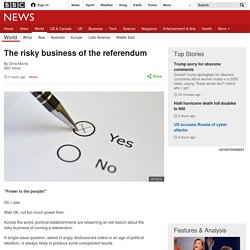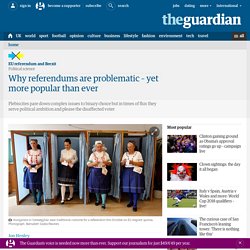

The risky business of the referendum. Image copyright iStock "Power to the people!

" Oh, I see. Well OK, not too much power then. Across the world, political establishments are relearning an old lesson about the risky business of running a referendum. A single-issue question, asked of angry disillusioned voters in an age of political rebellion, is always likely to produce some unexpected results. Brexit in the UK was obviously one. And just last week the Colombian President Juan Manuel Santos asked the people if they approved of peace. But they did. Image copyright AP Complex agreements are sometimes reduced to gut instincts. Even winning a referendum on paper can be portrayed as a defeat, because it can underline divisions in society over which leaders would prefer to draw a veil. Prime Minister Viktor Orban's call for Hungary to reject the EU's refugee quotas was approved by nearly everyone who voted.
The referendum has always had a bit of a chequered history, as a device beloved of dictators from Napoleon to Hitler. Why referendums are problematic – yet more popular than ever. The problems with referendums are well known: they reduce often complex questions to a binary choice; they are a demagogue’s dream, allowing populists free rein to fan fears, distort realities and appeal to emotions; voters can see them as a chance to voice their unhappiness about something else entirely.

And yet referendums are on the rise. In June, the EU referendum for Britain; last week, in Hungary, a referendum concerning refugees and migrants; in Colombia, one about a peace deal to end the country’s 50-year armed rebellion; and this December Italians will be given a vote on constitutional reforms. As often as not referendums do not produce the result the politicians intend. So what explains their popularity? A sharp increase in referendums is typical in periods of change and political uncertainty, according to Matt Qvortrup, professor of applied political science at Coventry University and author of Referendums Around the World. A lost referendum is rarely fatal. Thanks to the referendum, the tyranny of the majority has prevailed. Many people living in the UK, and some Britons outside it, had no vote in the referendum.

Scotland and Northern Ireland chose to Remain but will be forced to leave. Arash Heydarian Pashakhanlou argues the UK has succumbed to the tyranny of the majority thanks to the decision to put EU membership to a referendum. Alexis de Tocqueville, painted by Théodore Chassériau. Public domain The notion of the tyranny of the majority was popularised by the 19th century political thinkers Alexis de Tocqueville (Democracy in America) and John Stuart Mill (On Liberty). The most obvious victims of this tyranny of majority are the approximately 3.3m EU citizens who live in the UK – most of whom were not allowed to vote on the referendum (citizens of Ireland, Malta and Cyprus did have a say). Since the vote, True Vision and Stop Hate UK have reported an increase of hate crime directed against minority groups, including the approximately 800,000-strong Polish community in the UK.
Is there a future for referendums? The EU referendum has led to doubts about referendums as an instrument of public policy.

Albert Weale suggests that the good conduct of referendums depends on the question being clear and voters having easy access to the relevant evidence. The EU referendum failed both of these tests. Future referendums should be on well-defined questions and steps should be taken to provide access, in one convenient place, to the basic data necessary for votes to make a decision. After the Brexit referendum result, many of those who think of themselves as democrats but who voted Remain are having doubts about referendums as an instrument of public policy. Some are appealing to the purely advisory status of any referendum in the UK constitution. The basic case for holding a referendum is that there are some issues that arise on the political agenda of societies that cannot realistically be handled by the normal processes of contest among political parties. So what is the alternative?